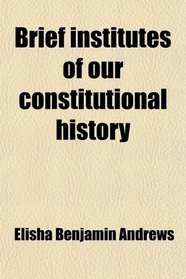Search -
Brief institutes of our constitutional history
Brief institutes of our constitutional history
Author:
Purchase of this book includes free trial access to www.million-books.com where you can read more than a million books for free. This is an OCR edition with typos. Excerpt from book: LECTURE II. THE REFORMATION IN ENGLAND. § i. Special Character. The ecclesiastical and theological overturn which moved all Europe in the XVIth century,... more »
Author:
Purchase of this book includes free trial access to www.million-books.com where you can read more than a million books for free. This is an OCR edition with typos. Excerpt from book: LECTURE II. THE REFORMATION IN ENGLAND. § i. Special Character. The ecclesiastical and theological overturn which moved all Europe in the XVIth century,... more »
ISBN-13: 9781459057357
ISBN-10: 145905735X
Publication Date: 8/6/2009
Pages: 102
Rating: ?
ISBN-10: 145905735X
Publication Date: 8/6/2009
Pages: 102
Rating: ?
0 stars, based on 0 rating




